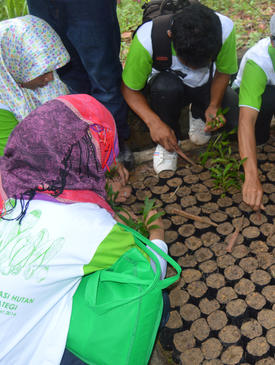Community and Stakeholder Engagement in the Conservation, Restoration and Management of Tropical Forest Landscapes
Summary
Successful efforts to conserve, restore, and manage natural resources within tropical forest landscapes require much more than knowledge of ecological factors. The ability to understand and integrate critical socio-cultural factors is essential. When people feel excluded from the benefits of a particular a particular strategy or intervention, for example, it is unlikely that project will achieve stated goals. Consequently, strategies aimed to conserve, restore, or manage natural resources must include comprehensive consultation with local communities to determine how they can be incorporated into the design and implementation of a project and obtain meaningful benefits. Even projects that are designed to provide local benefits can generate feelings of exclusion by some community members. It is, therefore, of great importance that decision-makers and practitioners focused on conserving, restoring and managing tropical forest landscapes are aware of these socio-cultural factors and the strategies employed that effectively address community and stakeholder engagement in different contexts.
Description:
Participants are invited to explore the socio-cultural aspects of stakeholder and community engagement in tropical regions. This course is designed for practitioners and professionals working with communities on the management, conservation, and restoration of tropical forests landscapes. Participants are invited to explore the principles and methodologies of local stakeholder engagement and consider the social factors that can impact the success of conservation, restoration, and management projects. Presentations introduce participants to social science theory related to projects that involve or impact stakeholders and communities who manage tropical forest landscapes. Participants will also learn about a variety of approaches to stakeholder engagement and integrating community needs and livelihoods through the use of diverse case studies from around the world.
The application period for this course has closed.
Content
The material is divided into thematic modules, each lasting a week. The modules consist of video lectures, interactive presentations, weekly exercises, and discussion sessions. Course materials include diverse case studies on community and stakeholder engagement from tropical Africa, Asia, and Latin America. Participants are free to complete their assignments for each module according to their own schedules.
During the course, participants will complete exercises that guide the development of a term paper that summarizes a plan to engage relevant stakeholders and communities for a focal project, or improve upon existing engagement efforts. It is ideal (although not required) that participants have a project that is relevant to their personal or professional interests about which they can direct the concepts learned in each module. Each participant will receive a course certificate upon completion of the course.
Participants will have a unique opportunity to connect with conservation and restoration leaders and practitioners, interact with Yale faculty, and learn about an issue of immense importance for people and the environment.
Thematic Modules:
- Week 1: Framing the Importance of Community and Stakeholder Engagement
- Week 2: Important Socio-political Factors and Considerations
- Week 3: Participatory Community-Based Research Methods
- Week 4: Case Studies Highlighting Community and Stakeholder Engagement
- Week 5: Integration of Livelihoods and Local Interests
- Week 6: Course Wrap-Up and Development of a Community Engagement Plan
Objectives:
- Introduce the principles and methodologies related to participatory research and community-based natural resource management;
- Provide an overview of case studies that employ research-driven and collaborative restoration and management projects;
- Provide guidance on stakeholder engagement and consideration of social factors that may impact the success of conservation or management projects;
- Facilitate the opportunity for participants to analyze the social implications of natural resource management projects and take a holistic view of project objectives
- Provide the opportunity for participants to engage in discussion sessions on a weekly basis and connect with a global network of practitioners working in community-based conservation, restoration, and management.


